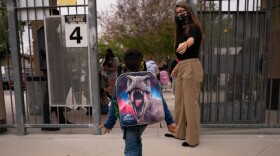North Korea is a country that demands attention from the international community, yet abruptly turns its back whenever outsiders try to understand its inner workings. The North's cloak of secrecy has become increasingly frustrating to analysts trying to determine who is in line to take over from the country's ailing dictator, Kim Jong Il.
Reports earlier this week in South Korean media say that he may have pancreatic cancer. Officially known as North Korea's "Dear Leader," Kim was out of sight for months after a rumored stroke last August. Recent photos have shown him looking gaunt and frail.
The developments have renewed interest in Kim's possible successors, including his youngest son, 26-year-old Kim Jong Un. His father designated Kim Jong Un as the country's future leader, and North Korean school children were being taught songs praising the "young general," according to media reports in June.
The World's Most Secretive Regime
But analysts caution that reliable information is difficult to come by. "It's the most opaque regime on Earth," says Ken Gause, a senior analyst at the Virginia-based think tank CNA.
Kim Jong Un is said to have attended a school in Switzerland under an assumed name. He studied English, German and French and enjoyed skiing and basketball.
The reports said Kim Jong Un was preferred as successor over two elder brothers who were regarded as weaker and less capable.
But how a transfer of leadership will unfold is guesswork by analysts in the West.
"Most likely one of the sons will be chosen," Gause says. "But because they don't have a power base, [the son] will likely be a figurehead for a collective leadership." That leadership, says Gause, might be lead by Kim Jong Il's brother-in-law, Jang Song Taek.
Gause points to rumors that Jang Song Taek, who was once purged from the government for becoming too powerful, may have made a deal with Kim Jong Il to support the youngest son.
Who will rise to power, and how, could be pivotal as the reclusive Communist nation develops a nuclear weapons program. In recent months, North Korea has defied the international community with missile and nuclear tests and locked up two American journalists on spying charges.
On Thursday, the United Nations added new sanctions to punish the North, banning travel by North Korean companies and individuals, and freezing some overseas financial assets.
North Korea had earlier threatened to retaliate by stepping up its production of nuclear material.
Two Paths To Power
Scott Snyder, director of the Center for U.S.-Korea Policy at the Asia Foundation, says that, in addition to examining rumors about the power dynamics in the Kim family, Korea watchers need to keep an eye on the institutional bases of power.
Traditional centers of power, Snyder says, are the National Defense Commission and the ruling committee of the Korean Workers Party. Kim Jong Il has reportedly been strengthening the Defense Commission, and might use it as a vehicle to move his youngest son into power.
Snyder notes that Kim Jong Un has an administrative position with the commission, while Jang Song Taek has recently become a member.
Analysts say another figure to watch is O Kuk-yol, a general and former head of the military general staff. He now leads North Korea's elite special forces troops, and is also a member of the National Defense Commission.
The rise of strong figures such as Jang and O poses the question of whether such a person would be willing to remain behind the scenes while another member of the Kim family enjoys the privileges of a leader.
Outward Provocations Foster Internal Unity
Both Snyder and Gause say that North Korea's belligerent posturing during the past several months is probably linked to the power struggle.
Snyder has written that the recent nuclear and missile tests project the image that the state is in control. By provoking condemnation from the international community, he says, the tests also create the sense that the country is under threat and help unify the North Korean people.
Gause cautions against ascribing the provocations solely to North Korea's internal power struggle, though. Part of it, he says, may be a test of the Obama administration and an effort to force a bilateral relationship with the U.S. It may also be that the North's military industries saw a need for testing to overcome technical problems.
Like nearly all information about North Korea, the analysts say news of the regime's power struggles is likely to come only through careful sifting of rumors, reports and minute signs in the country's state-run news media.
Copyright 2022 NPR. To see more, visit https://www.npr.org. 9(MDAzMjM2NDYzMDEyMzc1Njk5NjAxNzY3OQ001))






